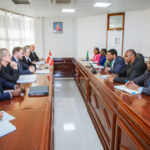On the auspicious occasion of Farmers’ Day, held on 8 August 2024, at the exhibition grounds of Nzuguni in Dodoma, the President of the United Republic of Tanzania, Her Excellency Dr. Samia Suluhu Hassan, took a significant step forward in showcasing the nation’s commitment to modernising agriculture. The President operated one of the state-of-the-art tractors that had recently been unveiled to the public, thereby symbolising the advent of a new era in Tanzanian agriculture.

A Milestone Event
The annual exhibition, held on the 8th of August and known as Nane Nane (Eight Eight), was not merely an exhibition of agricultural advancements; it was a significant event that served to demonstrate the government’s commitment to the agricultural sector. The event reached its conclusion with the laying of the foundation stone for the Central Agricultural Laboratory in Dodoma.
This modern and exemplary facility is destined to become a benchmark for the African continent. It is anticipated that this laboratory will assume a pivotal role in agricultural research, innovation and development, offering the requisite support to enhance productivity and sustainability in the sector.
Presidential Remarks
In her remarks, President Samia Suluhu Hassan underscored the pivotal role that the agricultural, livestock, and fishing sectors play in the Tanzanian economy. These sectors provide employment for a considerable proportion of the population, and thus their growth and success are vital for the country’s prosperity. The President underscored the government’s strategic decision to increase the budgetary allocation for these sectors by over fourfold over a three-year period.
This considerable investment is intended to stimulate innovation, enhance infrastructure, and furnish the requisite resources to farmers, livestock keepers, and fishers.
The Importance of Agriculture
Agriculture continues to represent a fundamental pillar of Tanzania’s economy, contributing considerably to the country’s gross domestic product (GDP) and providing livelihoods for millions of Tanzanians. It is impossible to overstate the importance of the sector, given its crucial role in ensuring food security, providing employment opportunities and maintaining overall economic stability.
The government’s commitment to modernising agriculture through increased funding and the introduction of advanced technologies is indicative of its recognition of the sector’s pivotal role.
Modernizing Agriculture
The introduction of modern tractors and other advanced agricultural machinery represents a pivotal element of the government’s strategy to modernise the sector. It is anticipated that these technologies will result in increased efficiency, reduced labour costs and enhanced productivity. The implementation of contemporary agricultural methodologies amongst Tanzanian cultivators can facilitate an enhancement in crop yields, a diminution in postharvest losses, and the assurance of a more sustainable and remunerative agricultural sector.
The Central Agricultural Laboratory
The Central Agricultural Laboratory in Dodoma is poised to become a pivotal institution in the realm of agricultural research and development in Tanzania. This cutting-edge facility will concentrate on a number of key areas within the field of agricultural science, including soil health, crop genetics, pest control and sustainable farming practices. By providing a focal point for pioneering research and innovation, the laboratory will facilitate the development of novel technologies and practices that can be disseminated to farmers throughout the country.
Supporting Livestock and Fishing Sectors
In addition to the agricultural sector, the livestock and fishing industries are also the subject of considerable attention and investment. These sectors are of vital importance for food security and economic development, providing essential protein sources and livelihoods for a significant proportion of the Tanzanian population. The government’s increased budget allocation will facilitate the implementation of initiatives designed to enhance livestock health, optimise fish farming practices and guarantee the sustainable management of natural resources.
Empowering Farmers and Rural Communities
One of the principal objectives of the government’s agricultural strategy is to provide farmers and rural communities with the tools and resources to enhance their capabilities and improve their circumstances. The government’s objective is to enhance the capacity of farmers to adopt innovative practices and improve their productivity by providing access to modern technologies, training, and financial resources. It is anticipated that this empowerment will result in augmented incomes, enhanced living standards, and augmented economic resilience in rural areas.
Sustainable Agriculture
The government’s agricultural policies are predicated on the tenet of sustainability. The objective is to advance practices that are environmentally friendly, economically viable, and socially responsible. This encompasses the promotion of organic fertilisers, the implementation of techniques for the conservation of water, and the encouragement of crop diversification. The implementation of sustainable practices by Tanzanian farmers will ensure the long-term productivity and resilience of agricultural systems in the face of climate change and other challenges.
The Role of Technology
It is indubitable that technology plays a pivotal role in the modernisation of agriculture and the assurance of its sustainability. The government’s investment in agricultural research and development is intended to facilitate the utilisation of technology in order to address the numerous challenges currently facing the sector. This encompasses the creation of drought-resistant crop varieties, the development of precision farming techniques, and the establishment of digital platforms for market access and the dissemination of information.
Collaboration and Partnerships
The success of the government’s agricultural initiatives is contingent upon the establishment of collaborative relationships with a diverse range of stakeholders, including international organisations, research institutions, private sector entities, and local communities.

The government’s objective is to leverage the expertise and resources of different partners by fostering a collaborative approach in order to drive innovation and achieve sustainable agricultural development.
Future Prospects
The future of Tanzania’s agricultural sector appears to be promising, with the government’s commitment to modernisation and sustainability paving the way for significant advancements. The increased budget allocation, coupled with the introduction of modern technologies and the establishment of the Central Agricultural Laboratory, paves the way for a transformative period in Tanzanian agriculture.
In conclusion, the celebration of Farmers’ Day in Dodoma constituted a significant milestone, underscoring the government’s unwavering commitment to the agricultural sector. President Samia Suluhu Hassan’s active participation and the unveiling of modern tractors symbolised the commencement of a new era in Tanzanian agriculture. With substantial investments, a focus on sustainability, and a collaborative approach, Tanzania is well-positioned to achieve significant growth and prosperity in its agricultural, livestock, and fishing sectors. The future holds considerable promise for Tanzanian farmers and rural communities, as they adopt modern technologies and innovative practices with a view to developing a more resilient and prosperous agricultural sector.
Tanzania Media
- Kanyala Ferry Launch: TEMESA’s New Service for 15,000 Sengerema Residents (Mwanza) - 18 August 2025
- Russia-Tanzania Naval Cooperation: How the Smolny Training Ship Boosts Dar es Salaam’s Maritime Security - 18 August 2025
- Tanzania’s ICGLR Commitment: Stabilising the DRC & Great Lakes Region - 18 August 2025











































